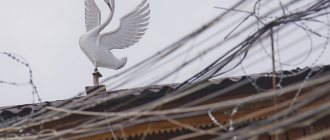Life imprisonment is one of the forms of criminal punishment in the Russian Federation. It has been actively used since 1996, when the last sentence imposing the death penalty was carried out in the country. As a rule, persons who have committed especially serious crimes, for which previously (before the introduction of the moratorium) the death penalty was imposed, are sentenced to this type of punishment.
It is believed that depriving a person of freedom for life is more humane than depriving him of his life. However, there is still no consensus in the professional community regarding this issue. The features of this type of punishment will be discussed further.
What is this based on the Criminal Code?
This type of criminal law influence on persons who have committed particularly serious crimes is provided for by current regulations. Thus, Article 57 of the Criminal Code of the Russian Federation establishes the nature of the crimes for which the courts impose this type of punishment. In addition, the Criminal Code contains an exhaustive range of persons against whom life imprisonment can be applied.
In itself, this concept is not disclosed in the Criminal Code, and the conditions and standards for the detention of convicted persons are established by the norms of the Criminal Executive Code of the Russian Federation.
Free legal consultation
+8 800 100-61-94
Characteristic
What are the characteristics of a sentence of life imprisonment?
It pursues the following goals:
- First of all, it is the isolation of a dangerous criminal from society. Most often, these people are antisocial or suffer from mental illness, so their presence among ordinary people is undesirable ;
- the next goal is to prevent him from committing new crimes. Firstly, it will be under constant control and supervision, which will reduce the possibility of criminal acts to a minimum. Secondly, the environment will have a frightening effect on him;
- and the last - influencing him for educational purposes, an attempt to correct him.
Is there any in Russia
Until 1996, the death penalty was usually applied to especially dangerous criminals. This punishment was widespread under the USSR. At that time, special regime colonies simply did not exist in their current form.
Reference! Life imprisonment as a form of punishment was not used in the USSR. As a rule, those persons who asked for pardon, if this request was granted, were placed in a maximum security colony for a period of 15 to 20 years.
However, in the 90s, Russia took the path of liberalizing criminal legislation related to the procedures for joining various supranational organizations and structures. In particular, one of the conditions for joining the Council of Europe was the complete abolition of the death penalty. In this regard, they began to save the lives of especially dangerous criminals by placing them in life imprisonment.
Corresponding sentences were passed throughout almost the entire post-Soviet history of our country. According to open data provided by the Federal Penitentiary Service, in 2022 the number of persons who were sentenced to serve the corresponding sentence was 2,015 people. According to statistics, every year, on average, several dozen people are sentenced to this type of sentence. However, in some years their number was significantly higher. Thus, in 2001, 124 people were placed in the corresponding colonies, most of whom were representatives of the gang underground in the North Caucasus.
general information
This punishment appeared in Russian criminal legislation relatively recently (about 20 years ago). However, its historical origins can be found back in the Middle Ages. The use of life imprisonment is due to the fact that:
- on the one hand, the Russian Federation, in fulfillment of international obligations, abolished the death penalty;
- on the other hand, there remains a need to apply severe punishment to especially dangerous criminals.
A life sentence means that a person will be in custody until death - for physiological or some other objective reasons.
For prisoners of this type, special, more severe conditions of detention are provided. Also, life imprisonment is accompanied by many problems and difficulties, especially regarding prisoners.
How many years is the term in Russia?
As the name of this type of punishment implies, it is applied not for any specific period, but until the end of the life of the convicted person. For him, this means that he will always have to be in prison. The term of criminal punishment is considered completed from the moment of death of the convicted person.
Such a severe punishment, among other things, has a preventive function. As a rule, such convicts are repeat offenders or pose a significant threat to society. By isolating them forever, the state ensures the safety of citizens from persons who are prone to committing especially serious crimes.
Serving a sentence after parole
It should be understood that parole is more of a probationary period than a real termination of punishment. Having committed an offense, a citizen can return to prison again. This is possible under the following circumstances:
- While at large, the citizen committed an administrative offense.
- The person released on parole did not comply with the obligations imposed on him by the court. We are talking about employment or recovery from alcoholism.
- The former prisoner committed a crime before the expiration of his criminal record. In this case, the court will assign him a new punishment in accordance with the crime committed. In addition, the unserved sentence for previous criminal acts will be partially or fully added to it.
What do they give for?
Considering the severity of the punishment, it should be understood that it is imposed in exceptional cases when the court does not find other options for correcting and isolating the person. To avoid excesses, the legislator in Art. 57 of the Criminal Code of the Russian Federation established a list of types of crimes, having committed which, the offender can forever part with freedom. Let's take a closer look.
- Encroachments on the life and health of citizens. An example would be aggravated murder.
- Terrorism . Various forms of terrorist activity, including those that do not result in death, are punishable by life imprisonment.
- Drug trafficking. Production and sale of large and especially large quantities of narcotic substances, organization of drug trafficking.
- Crimes against the sexual freedom of minors . When rape and sexual assault are committed against persons under 14 years of age.
- Organization of criminal communities. Leaders and active participants of organized criminal groups are sentenced to life imprisonment.
- Genocide. Genocide should be understood as the deliberate destruction of representatives of certain national or religious groups.
Attention! Life imprisonment is also applied to repeat offenders who have committed serious crimes in the aggregate.
When making an appropriate sentence, the judge takes into account all the circumstances of the particular case. So, for example, confession or active cooperation with the investigation can contribute to a more lenient punishment.
In general, it should be understood that this type of imprisonment is used in exceptional and high-profile cases, and each such sentence is closely assessed by representatives of government agencies for validity and fairness.
Life imprisonment as an independent type of criminal punishment
Life imprisonment in the criminal legislation of post-revolutionary Russia first appeared in 1992 by the Law of the Russian Federation of December 17, 1992 No. 4123-1 in Art. 24 of the Criminal Code of the RSFSR of 1960, an addition was made according to which “if the death penalty is replaced by pardon by imprisonment, it can be imposed for life.” In an effort to reduce the use of the death penalty, the legislator introduced its alternative - life imprisonment. However, the courts did not have the right to impose this measure: only the President of the Russian Federation could apply it, exercising the right granted to him by the Constitution of the Russian Federation to pardon those sentenced to death.
However, the Criminal Code of the Russian Federation went further. Having retained the right of the President of the Russian Federation to impose life imprisonment when pardoning those sentenced to death, he introduced life imprisonment into the punishment system (clause “m” of Article 44 of the Criminal Code of the Russian Federation), allowing it to be used by the courts as an independent punishment for committing especially serious crimes encroaching on life, when the court deems it possible not to apply the death penalty (Part 1 of Article 57 of the Criminal Code of the Russian Federation). But even in this case, the law considered life imprisonment only as an alternative to the death penalty. Therefore, this punishment was provided only in those articles of the Criminal Code of the Russian Federation, the sanctions of which included the death penalty (aggravated murder, encroachment on the life of a state or public figure, encroachment on the life of a person carrying out justice or preliminary investigation, encroachment on the life of a law enforcement officer, genocide ).
The next change in the legal nature of life imprisonment dates back to 2004. The legislator amended a number of articles of the Criminal Code of the Russian Federation and excluded the indication that life imprisonment can only be provided as an alternative to the death penalty. At the same time, sanctioned by Art. 205 of the Criminal Code of the Russian Federation, which provides for liability for terrorism, a penalty of life imprisonment was introduced. However, the principle of imposing life imprisonment only for the most dangerous crimes - especially serious acts that encroach on human life - has remained unshakable, because, although terrorism is at the head of crimes against public safety, it is clear that its additional object is human life. In practice, acts of terrorism are aimed at causing death to many people.
Thus, now life imprisonment is a completely independent type of criminal punishment. Its connection with the death penalty is manifested only in the fact that they are provided only for the most dangerous crimes.
Currently, the role and importance of life imprisonment are especially increasing due to the fact that the death penalty in accordance with the Resolution of the Constitutional Court of the Russian Federation dated 02.02.1999 No. 3-P is not applied and will not be applied, at least until introduction of jury trials in all constituent entities of the Russian Federation. In accordance with Federal Law No. 177-FZ of December 18, 2001 “On the implementation of the Criminal Procedure Code of the Russian Federation,” the creation of jury courts should be completed in 2010, when such courts will be created in the Chechen Republic (in all other constituent entities of the Russian Federation these courts have already been created).
Life imprisonment is currently applied by the courts of the Russian Federation. For example, in 2006, it was assigned to 46 convicts. At the same time, the legislator limited the possibilities of its application, prohibiting the application of this punishment to women, minors and men who had reached 65 years of age at the time of the court’s verdict (Part 2 of Article 57 of the Criminal Code of the Russian Federation). Exactly the same limitation is established when applying the death penalty.
The introduction of life imprisonment into the criminal punishment system represents the first stage of preparation for the abolition of the death penalty, which, as is known, was one of the conditions for Russia’s admission to the Council of Europe. According to the accepted obligations, this punishment should have been excluded from the punishment system no later than 1999. Although the death penalty has not been abolished in Russia at present, it has not been carried out since 1997, and since 1999 it has not been imposed. In addition, the inclusion of life imprisonment in the punishment system reflects a certain trend in the development of the state’s criminal policy at the present stage, the formation of which should take into account the state of crime in the country, its dynamics and structure, which, as is known, are unfavorable and are characterized by a fairly high level. This is especially true for grave and especially grave crimes of a violent, mercenary-violent and mercenary nature.
The current crime situation stimulates the adoption of tough measures to combat crime, including in criminal legislation. One of these measures is a significant increase in the new Criminal Code of the Russian Federation (and in the process of its application) of terms of imprisonment for committing especially serious crimes. Until 1997, the maximum term of imprisonment was 15 years. The new Criminal Code of the Russian Federation increased this period to 20 years (Part 2 of Article 56); in case of aggregation of crimes - up to 25 (part 3 of article 69), and in case of aggregation of sentences - up to 30 years (part 3 of article 70). Therefore, the introduction of life imprisonment represents the logical conclusion of changes in the terms of this type of punishment.
Although the new Criminal Code of the Russian Federation provided for life imprisonment as an independent type of punishment, from the point of view of the legal nature, characteristics and content, it is a type of imprisonment, since it corresponds to its essence - the isolation of the convicted person from society (Part 1 of Article 56 of the Criminal Code of the Russian Federation). It is this circumstance that can explain the fact that the Penal Code of the Russian Federation did not separate the execution of this type of punishment into a separate chapter, although the execution of other types of punishment is regulated in independent sections and chapters of this Code.
The identification of life imprisonment as an independent type of punishment is also explained by the extraordinary nature of some of its features, which are not inherent in other types of punishment associated with isolation from society. It is not limited to a specific deadline and, in addition, its appointment and execution are not aimed at achieving the goal of correcting the convicted person and, therefore, it pursues only the goal of special and general prevention. This provision is confirmed, in particular, by the fact that in Art. 126-127 of the Penal Code of the Russian Federation do not provide for educational work, general and vocational training with this category of convicts, although the use of coercion may contribute to their correction.
In the Criminal Code of the Russian Federation, two types of life imprisonment can be distinguished, which differ from each other on the basis of their appointment. In one case, it is appointed by a court verdict, in the other - by the Decree of the President of the Russian Federation on pardoning a person sentenced to death (clause “c” of Article 89 of the Constitution of the Russian Federation). Part 2 Art. 85 of the Criminal Code of the Russian Federation defines the act of pardon as an independent basis for replacing the punishment with a more lenient one. Thus, pardon has become an interdisciplinary institution of constitutional (state) and criminal law.
As of January 1, 2007, there were 698 people in special regime colonies for whom the death penalty was commuted to life imprisonment by way of pardon. As sociological research materials show, they were convicted of murder under aggravating circumstances: 70% of them killed two or more people, 35% took the lives of children and minors or committed this crime in order to conceal other crimes; 21% of them, along with murder, committed such serious crimes as rape, robbery, banditry, terrorism, hostage-taking, etc. The vast majority (80%) had a previous criminal record, half of them had three or more. More than 50% of them had previously committed violent crimes.
The majority of convicts (70%) are people aged 30-49 years. They have already formed stable antisocial beliefs, a life position and a criminal worldview. In terms of education, 70.6% of them have completed secondary, specialized secondary, incomplete higher or higher education. They are alienated from society: 73.8% are single or divorced. An indicator of this alienation is the fact that 26% of them refused to apply for their pardon.
The health of many of them is unsatisfactory: 36% are recognized as suffering from alcoholism, 30% have mental disorders that do not exclude sanity, and psychopathic personality changes.
Thus, the contingent of convicts serving life imprisonment is extremely negative in terms of socio-psychological, criminological and criminal legal characteristics, which presupposes the use of strict measures in places of serving sentences to ensure the safety of society and citizens through strict isolation of convicts and harsh conditions of their detention, applying to them a set of measures of a medical, psychological and psychiatric nature in order to prevent new crimes on their part. These measures are applied taking into account the provisions of Part 2 of Art. 22, art. 97-104 of the Criminal Code of the Russian Federation and Art. 18 of the Penal Code of the Russian Federation, regulating the grounds and procedure for applying medical measures.
Who can be assigned
The current legislation definitely establishes the circle of persons who cannot be sentenced to this type of punishment.
Thus, life imprisonment does not apply to:
- Minors. Criminals under the age of 18 cannot be sentenced to long terms of imprisonment, regardless of gender.
- Senior citizens. Elderly criminals who are over 65 years old also cannot be sentenced to serve their sentences in special regime colonies. This restriction was introduced due to the principles of humanity. The age of the offenders is taken into account at the time of sentencing. For example, if a particularly serious crime was committed by a minor who was 18 years old at the time of sentencing, he may receive a life sentence.
- Women. Women cannot be sentenced to this type of sentence, regardless of the severity of the crime committed.
Thus, only adult men who have not reached the age of 65 can serve a life sentence.
Problems
The first problem with life imprisonment is the question of the humanity of such a punishment. After all, the chances of being released are practically zero, and the person knows this. But on the other hand, he can be dangerous to society and the people around him, so he must be protected from them.
When compared to the death penalty , it is a more lenient punishment that gives the accused the opportunity to continue living .
Also one of the main problems is the psychological state of prisoners. Most often they live in double cells, and living and communicating with the same person for a long time leads to many conflicts .
Great doubts arise about the possibility of re-educating a criminal - after at least a quarter of a century of being in isolation, a person can only become more embittered, and not take the path of reform.
Places and conditions of departure
Citizens sentenced to this type of punishment serve it in special institutions of the penitentiary system - special regime colonies. The conditions there are quite harsh.
In total, there are 8 special regime colonies in Russia. Undoubtedly, each of them has its own code in the correctional system, but they are better known by their unofficial names:
- "Black Golden Eagle" - Sverdlovsk region.
- “Snezhinka” – Khabarovsk Territory.
- "Polar Owl" - Yamalo-Nenets Autonomous Okrug.
- "Torbeevsky Central" - Republic of Mordovia.
- “Mordovian zone” – Republic of Mordovia.
- “Black Dolphin” – Orenburg region.
- “White Swan” – Perm region.
- “Vologda nickel” – Vologda region.
Prisoners are kept in special cells. As a rule, they are designed for two. However, at the request of prisoners or by decision of the head of the correctional institution, the convicted person may be kept in solitary confinement.
The special contingent has a strict daily routine and the opportunity to carry out labor activities on the territory of the colony. In addition, walks in the fresh air are allowed under the supervision of FSIN employees. The usual walking time is 1.5 hours, but can be extended in some cases.
Important! Dating is allowed. They can take place no more than 2 times a year for a period of no more than 4 hours. A correctional officer must be present in the visiting room.
What possible relaxations are there?
Article 127 of the Penal Code of the Russian Federation defines several types of regime for serving a sentence in special regime colonies. So, all new arrivals are under strict regime. If, after 10 years, no cases of violation of the rules have been observed for the prisoner, then he is transferred to normal conditions.
After another 10 years, the representative of the special contingent is transferred to easier conditions. This involves certain relaxations, consisting of an increase in the number of permissible parcels and the hours allocated for being in the fresh air.
Case from practice
One of the most resonant cases of application of Art. 57 of the Criminal Code of the Russian Federation is the conviction of members of the terrorist nationalist group “Spas”, led by Nikolai Korolev and Nikita Tikhomirov. It was established that these individuals created the military sports club “Spas” in 2005, which was not officially registered and was used to spread extremist ideas.
However, the club’s activities were not limited to ideology alone. Thus, the investigation established that in the period from August 21, 2006 to April 22, 2007, members of this group under the leadership of Nikolai Korolev committed a number of terrorist actions, including organizing explosions at the Cherkizovsky market in Moscow, in a prayer room for Muslims in Yakhroma near Moscow , as well as in a number of other objects. The attacks killed 14 people.
On May 15, 2008, the Moscow City Court, based on a jury verdict, sentenced the leaders of the Spas group, Nikolai Korolev and Nikita Tikhomirov, to life imprisonment. The remaining participants received various sentences. It is known that today Nikolai Korolev is serving his sentence in the special regime colony “Polar Owl” in the Yamalo-Nenets Autonomous Okrug.
May be interesting: Forced labor
Who is applying for parole
An application for parole can be submitted by any convicted person who has served the minimum prescribed sentence. But you should understand that not every request will be granted.
The chances of a positive decision by the commission increase if the prisoner:
- received positive characteristics at the place where he was serving his sentence;
- did not violate established procedures;
- has stable connections in the outside world (close people, friends);
- worked diligently or completed training while serving his sentence;
- was awarded by the colony administration for providing assistance;
- compensated the victim for damages in full.







